QuestionQUESTION: Hello.
I have a question about my ferret. He is a year and a half now and recently I noticed he has a hair loss on the tip of his tail. At first I thought it is just a dirt(because he is albino and it looked like a black patch of dirt) but when I gave him bath i was shocked seeing that it was actually a hair loss. I have heard about adrenal disease but because I live in a very small town I dont think my vet could actually help me. I can send you a picture of his tail if you require. Please help me.
Kind regards
Lauma
ANSWER: Hello Lauma,
Hair loss on the the tail in ferrets is very typical of adrenal disease. I have a bit of experience with the condition, as one of my adopted ferrets was recently diagnosed. Unfortunately, neither I nor anyone on the internet is capable of diagnosing any condition. He needs to have a physical by a licensed veterinarian and appropriate treatment. I can tell you a bit more about adrenal disease, the causes, symptoms and most common treatment options so you can discuss them with your doctor.
Causes: Adrenal disease is caused by tumorous growths on one or both adrenal glands, which lie above each kidney. It causes an overabundance of hormones production, such as estrogen which is the major reason for the hair loss. Testosterone is also produced, which can lead to increased aggression in males. No one is certain what triggers adrenal disease, but some speculate that it is the overabundance of artificial light, early spay/neutering, diet, or genetics.
It is thought that the early spaying/neutering is a MAJOR cause since it is rarely seen in countries such as the UK which do not practice altering at a young age. One of my ferrets I purchased at a private breeder and neutered him at 8 months of age. The breeder has never seen a case of adrenal in her line, likely because she does NOT have them altered at 6 weeks of age as commercial breeders commonly practice. For These reasons I will not support Marshall Farms or large-scale facilities by purchasing their products or pets. I always adopt or obtain my ferrets from a knowledgeable breeder.
Symptoms: One of the major symptoms is hair loss or thinning that begins on the tail and/or back and works its way up toward the shoulders. This is a classic manifestation of the disease, and it seen in most cases. Some other symptoms include swelling of the vulva (female false heat), thinning of the skin, a dry or brittle pelt, aggression (in males), weight loss and sometimes lethargy. Not every case of adrenal disease will present with all of the above symptoms.
Treatment: Adrenal disease is 100% fatal IF untreated. The best method is surgery to remove the affected gland(s). In a young ferret, this will likely be the best option. In older ferrets, or those that cannot go through surgery, there are medications (Lysodren, Lupron, melotion injections, etc) that can help slow the progression of the disease and promote fur growth. Medication will NOT stop the condition, but it will allow a longer more comfortable life. Adrenal disease is VERY painful and if left untreated your ferret will die a terrible death and surgery is the ONLY cure.
Additional Information:
http://www.ferretcentral.org/faq/med/adrenal.html
http://www.ferret-universe.com/health/adrenal.asp
http://www.cypresskeep.com/Ferretfiles/Adrenal.htm
What you should do: The first thing is find a ferret knowledgeable veterinarian (see links below) and have him or her perform a physical exam. This should rule out another cause for the hair loss. For example, parasites such as mites or fleas can produce similar symptoms or your ferret may have abnormal shedding. The doctor might opt for an ultrasound which is a good idea. Ultrasound is a great way to diagnose without jumping directly to surgery when an adrenal gland might be too small to find at all! I am speaking from experience, so let me explain my situation. It might be useful.
My 4 year old female rescue ferret had this exact same thing occur several months ago. I brought her to a school of veterinary medicine when I noticed the fur on her tail thinning overnight. No other obvious reason for the hair loss could be found on the physical exam, so the doctor concluded it was most likely adrenal disease. I had an ultrasound preformed, but no tumors were seen. He explained that they are probably there, but the disease has not progressed to a point where the glands are large enough to be visible. Normal ferret adrenal glands are smaller than a pinhead and might not be found during surgery! His advice was to give a 6-month Lupron injection and recheck at that time with a follow-up ultrasound. This will evaluate any changes or tumor growth that would make surgery a reasonable option. In the meantime, her fur has grown back and she as as happy and bouncy as ever. This does not mean the tumor(s) have ceased since Lupron only masks the symptoms. The combination of a recheck once the Lupron wears off and a second ultrasound will give the doctor a better idea if and when surgery is the next step. Right now, I can only wait and see. If indeed there is pronounced tumor growth in 6 months, I will opt for surgery since she is still fairly young and healthy.
In your situation, treatment/detection is very important for a good prognosis. Do not wait until the disease has progressed to seek help. In my case it is too early for surgery, but at least I have the ability to monitor the progression of the disease and opt for surgery when the time is right. Every ferret is a bit different, and there is no way to tell if your ferret's adrenal disease is advanced even though he is just starting to show symptoms.
You mentioned that you live in a small town and may have difficulty finding a ferret knowledgeable veterinarian. Below is a list of ferret-friendly doctors worldwide (I am unsure if you live in the USA). Another option is to head for the nearest school of Veterinary Medicine. These are state of the art facilities with specialists on call at all times. For example, a board certified radiologist interpreted my ferret's ultrasound and an exotics specialist took the case. I can rest assured that both are more than qualified, and I would highly recommend this option.
VETS CANADA:
* http://www.ferretrescue.ca/start.php
* http://tinylink.com/?TlVyYKa6e0
* http://www.ferrets.org/Veterinarian_Listings.htm (British Columbia)
* http://www.ferretcentral.org/for-others/db-vets.html
VETS USA:
* http://www.quincyweb.net/quincy/vet.html
* http://ferrethealth.org/vets/
* http://www.ferret-universe.com/vets/vetlist.asp
* http://www.ferretsanctuary.com/vets.shtml
* http://www.ferretcentral.org/for-others/db-vets.html
* http://ferrethealth.org/vets/
VETS UK & IRELAND:
* http://homepage.ntlworld.com/ferreter/vetlist.htm
VET INFO/ LIST OF FERRET GROUPS/ CONTACTS IN UK, ITALY, NEW ZEALAND, AUSTRALIA, NETHERLANDS, GERMANY & DENMARK:
* http://www.ferretcentral.org/for-others/db-overseas.html (scroll down page to find the one you are looking for)
Please let me know how this turns out with your fellow. I will be wondering about his progress and what the vet thinks is causing the hair loss. Please keep me posted!
Best regards,
-Cindy P.
---------- FOLLOW-UP ----------
QUESTION: Thank you for your information. Unfortunately I live in a small town in Western Australia and I remember when about a year ago Albert was feeling crook we took him to vets and they couldnt find out what was wrong with him. It turned out he caught cold from one of us and all he needed was a bit of antibiotics and egg yolk. It took us about 3 days and several visits to the vets to finally find out through internet and few phone calls to ferret friendly vet in our capital city.
I see you are saying that males increase their aggression,but Albert is calmer than ever. He eats good,but he isnt that playful. He is more cuddly right now,always wants to be in my lap cuddled up between my arms. He never was very active ferret as we got him very very young,the pets store realised that we wanted to buy a cage on internet,called us next day and told us he is ready,but he couldnt even walk and used to sleep in a box. i read that adrenal disease makes the skin orange,but his tip of the tail is more like black with black dots. I was thinking about the rat tail. But I will take him to vets and see what they say,althought I dont have a big hope of their knowledge.
Thank you alot for your reply.
Much appreciated.
P.S. I will let you know how things go.:)
Regards
Lauma
AnswerI hear there is a desperate need for more veterinarians in Australia. I fell in love with the country when I visited afew years ago, and I'm pretty sure that once I am done with vet school I'll end up there. So far I have only seen the Eastern coast, but eventually I'd like to go back and see the rest of it. I had planned to attend school there as well, but for some reason ferrets cannot be imported (yet they are allowed in most places..wierd). I think it has something to do with the quarentine setup and not having the proper cages and such for importation.
Since your ferret was a late neuter it puts adrenal disease further down on the list. It does not rule it out since anything is possible, but it makes it less likely. I have found rat tail affects males more than females and usually around this time of the year (or at least it is here in the USA since the breeding season is in late winter or early spring). I've seen this in my big guy every year. The fur on the bottom of his tail begins to thin and plenty of "blackheads" can be seen on the surface of the skin. When I notice this, I scrub his tail every 2-3 days with mild anti-acne cleanser or astringent-type cleanser (such as one for sensitive skin). I use the premade "achne wipes", scrub the tail as best I can with them and then rinse/wash his tail again with ferret shampoo. Make sure you get close to the skin and over the course of several washes you should notice less and less blackheads clogging the pores. The fur should grow back either immediately or with the next coat change. It can take a full cycle for the regrowth to appear. Don't use the treatment too often or his fur will become very brittle and dry.
Information on rat tail:
http://www.ferretcentral.org/faq/part4.html#hair_loss
Let me know if I can help out with any further questions!
-Cindy P.

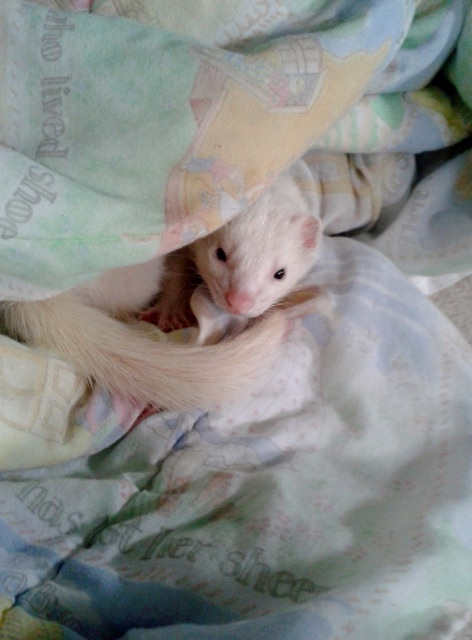 My ferret, Cloud
QuestionQUESTION: I used to have 2 ferrets who were ver
My ferret, Cloud
QuestionQUESTION: I used to have 2 ferrets who were ver
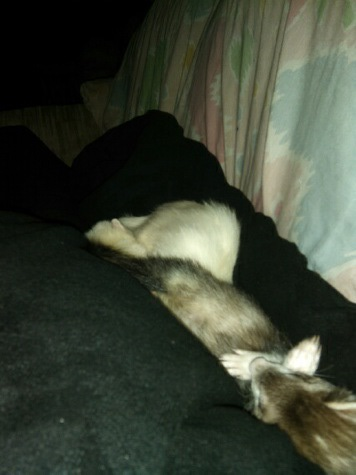 Maggots found in ferret cage?!
Question
Cloud and Bandit
So i have had my femal
Maggots found in ferret cage?!
Question
Cloud and Bandit
So i have had my femal
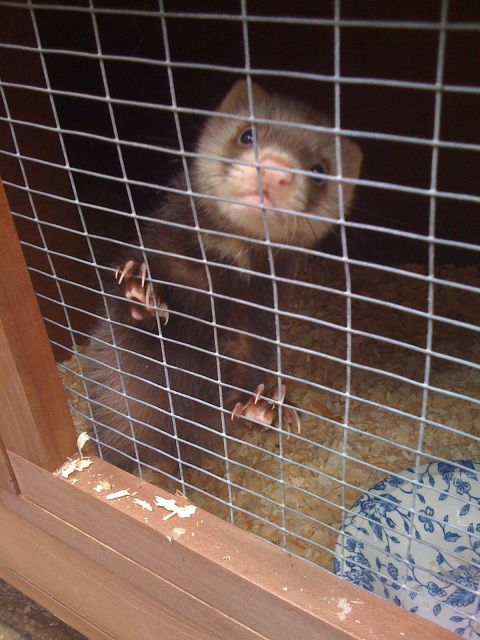 biting
Question
rascal
hey, i have just bought my first ever f
biting
Question
rascal
hey, i have just bought my first ever f
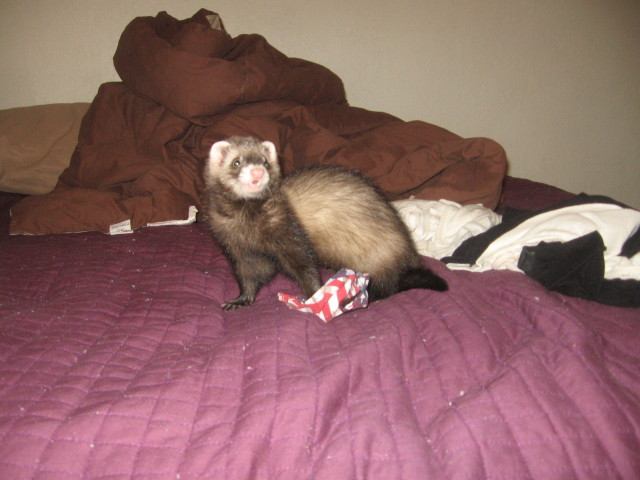 ferret ear problems
Question
I cant wait to get he
Hi Cindy!
I have a ferre
ferret ear problems
Question
I cant wait to get he
Hi Cindy!
I have a ferre
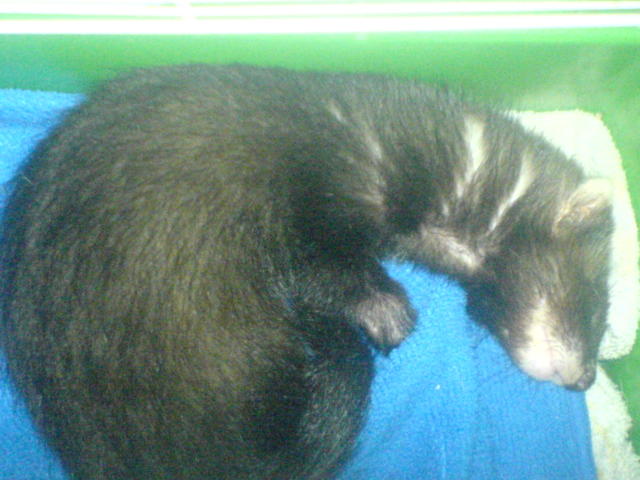 ferret breeds and behaviour
Question
Oscar
hey, i got an 11 week old hob called Osc
ferret breeds and behaviour
Question
Oscar
hey, i got an 11 week old hob called Osc